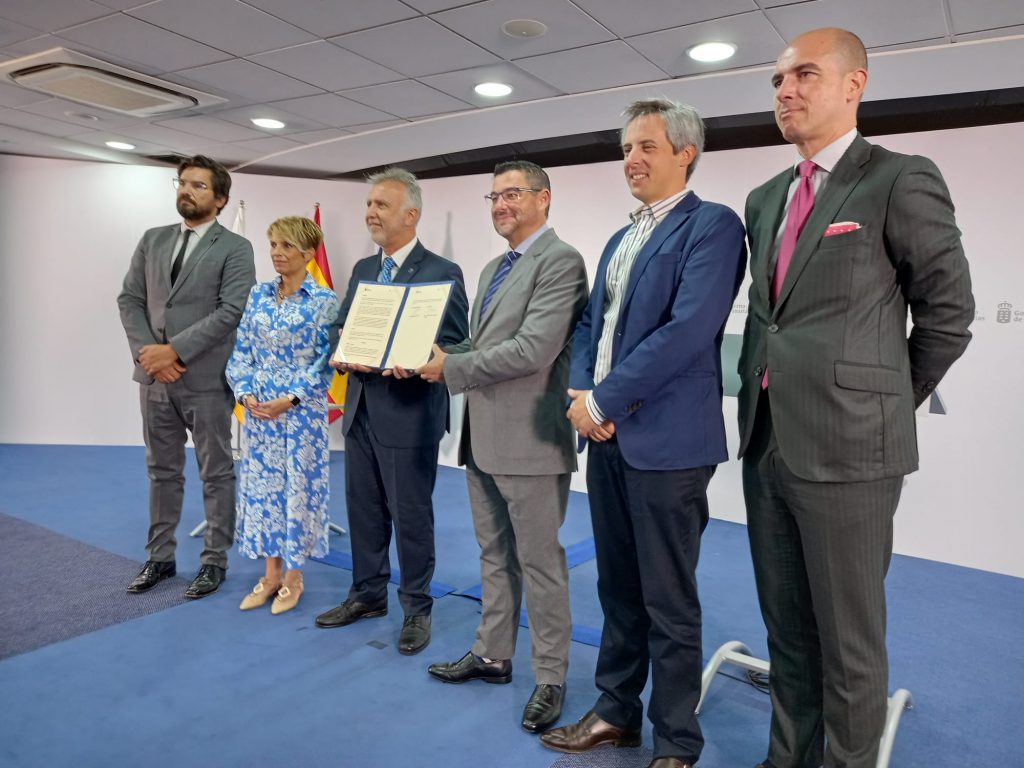The president of the Canary Islands, Ángel Víctor Torres, and the president of Alastria, Miguel Ángel Domínguez, signed a collaboration protocol on Monday to include blockchain in the Canary Islands’ digital transformation process.
This makes the Canary Islands the second Spanish region, after Madrid, to become part of Alastria’s massive network of more than 500 members, a community made up of public and private organisations and individual experts to promote the implementation, standardisation, protection and use of distributed ledger technologies (DLT) or blockchain, raise public awareness about it and encourage its use among public administrations, companies and other social stakeholders.
Blockchain has enormous potential to protect digital services within councils’ administrative processes, securing the service provided to citizens. Functioning as a giant database, this technology could be used to log assets such as academic qualifications, certifications or files, and will provide citizens with a digital identity that allows them to own their data and decide what they want to share, when and with whom.
Torres highlighted the opportunities offered by this technology to improve how information is transferred and gave several examples of its potential, including waste management control, sustainable mobility and air quality monitoring in future smart cities.
He also pointed out that blockchain applied to the energy industry, for example, would allow us to know the exact amount of clean energy we produce in each home and how much is fed into the grid; or to more accurately calculate the carbon footprint made by every activity, which is “something the Canary Islands is determined to take firm steps towards”.
For Torres, “digitalisation must be at the service of people, help usher in a necessarily sustainable future and promote equal opportunities”.
He stressed that this type of system for sharing transaction data securely and transparently will be one of the topics to be addressed at the OECD Digital Economy Ministerial Conference to be held in December in the Canary Islands, “an event that will bring together representatives from more than 60 countries and place the Canary Islands at the centre of the debate on digital transformation, which is being applied in the Islands in sectors, such as tourism, where we are leading the way”.
For his part, Domínguez highlighted that this agreement will make it easier for Canary Islands companies to take up this technology, and at an excellent time due to its level of technological and regulatory maturity, and assured that “public-private collaboration will allow these benefits to reach the public sector, business and the wider public”. He explained that the largest companies in the country are working together with SMEs “to build a technological ecosystem that enables the creation of new digital businesses and improved efficiencies that make companies more competitive and sustainable”.
Today’s signing marks the launch of a collaboration protocol that will also pave the way for research and training projects, programmes and activities, seeking synergies with the business world and the innovative ecosystem.
Digitalisation is one of the focal points for transformation in the Canary Islands, which has increased the relevant budget fourfold to the tune of €23 million in its annual digital planning. The Canary Islands have also received €20.4 million from the Spanish government to invest between 2021 and 2023 to strengthen connectivity in key public centres and industrial estates, provide aid to homeowners’ associations to install telecommunications infrastructures, and provide digital connectivity and training allowances to help the public acquire digital skills.
The agreement includes the possibility of the Canary Islands receiving the advice it needs to set up its own node in Alastria’s blockchain networks, thus joining a trusted environment to exchange data more transparently, dynamically and easily. It also provides for the implementation of joint actions to disseminate this technology at congresses, seminars, conferences, workshops and other specific events.
In order to develop, monitor, promote, coordinate and evaluate this general protocol, a monitoring committee will be set up with at least two representatives appointed by each party.
